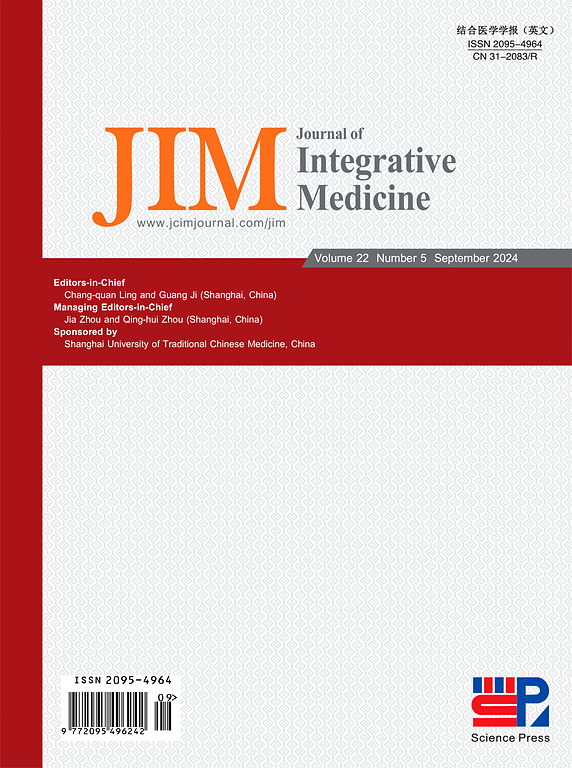Sinisan, a compound Chinese herbal medicine, alleviates acute colitis by facilitating colonic secretory cell lineage commitment and mucin production
IF 4
2区 医学
Q1 INTEGRATIVE & COMPLEMENTARY MEDICINE
引用次数: 0
Abstract
Objective
Ulcerative colitis is closely associated with intestinal stem cell (ISC) loss and impaired intestinal mucus barrier. Sinisan (SNS), a compound Chinese herbal medicine, has a long history in the treatment of intestinal dysfunction, yet whether SNS can relieve acute experimental colitis by modulating ISC proliferation and secretory cell differentiation has not been studied. Our study tested the effect of SNS against acute colitis and focused on the mechanisms involving intestinal barrier recovery.
Methods
Network pharmacology analysis and blood entry component analysis of SNS were used to explore the underlying mechanism by which SNS affects the acute dextran sulfate sodium (DSS)-induced murine colitis model. RNA-sequencing was used to demonstrate the mechanism. Further, reverse transcription-quantitative polymerase chain reaction, immunofluorescence staining, and alcian blue and periodic acid-Schiff staining were performed in vivo and in the colonic organoids to investigate the cell lineage differentiation-related mechanism of SNS. Furthermore, potential active ingredients from SNS were predicted by network pharmacology analysis.
Results
SNS dramatically suppressed DSS-induced acute colonic inflammation in mice. RNA-sequencing analysis revealed downregulation of inflammation and apoptosis-related genes, and upregulation of lipid metabolism and proliferation-related genes, such as Irf7, Pparα, Clspn and Hspa5. Additionally, ISC renewal and intestinal secretory cell lineage commitment were significantly promoted by SNS both in vivo and in vitro in colonic organoids, leading to enhanced mucin expression. Furthermore, potential active ingredients from SNS that mediated inflammation, lipid metabolism, proliferation, apoptosis, stem cells and secretory cells were predicted using a network pharmacology approach.
Conclusion
Our study shed light on the underlying mechanism of SNS in attenuating acute colitis from the perspective of ISC renewal and secretory lineage cell differentiation, suggesting a of novel therapeutic strategy against colitis.
Please cite this article as: Cai YJ, Lan JH, Li S, Feng YN, Li FH, Guo MY, et al. Sinisan, a compound Chinese herbal medicine, alleviates acute colitis by facilitating colonic secretory cell lineage commitment and mucin production. J Integr Med. 2025; 23(4): 429–444.
四散是一种复方中草药,通过促进结肠分泌细胞谱系的承诺和粘蛋白的产生来缓解急性结肠炎。
目的:溃疡性结肠炎与肠干细胞(ISC)丢失和肠粘液屏障受损密切相关。四散是一种治疗肠道功能障碍的复方中草药,但其是否通过调节ISC增殖和分泌细胞分化来缓解急性实验性结肠炎的研究尚未见报道。我们的研究测试了SNS对急性结肠炎的作用,并着重于肠道屏障恢复的机制。方法:采用网络药理学分析和SNS的入血成分分析,探讨SNS对急性葡聚糖硫酸钠(DSS)诱导的小鼠结肠炎模型的影响机制。rna测序被用来证明其机制。进一步,在体内和结肠类器官中进行逆转录-定量聚合酶链反应、免疫荧光染色、阿利新蓝和周期性酸-希夫染色,研究SNS的细胞系分化相关机制。此外,通过网络药理学分析预测SNS的潜在有效成分。结果:SNS可明显抑制dss诱导的小鼠急性结肠炎症。rna测序分析显示炎症和凋亡相关基因下调,脂质代谢和增殖相关基因上调,如Irf7、Pparα、Clspn和Hspa5。此外,在体内和体外的结肠类器官中,SNS显著促进了ISC的更新和肠道分泌细胞谱系的承诺,从而增强了粘蛋白的表达。此外,利用网络药理学方法预测了SNS中介导炎症、脂质代谢、增殖、凋亡、干细胞和分泌细胞的潜在活性成分。结论:我们的研究从ISC更新和分泌谱系细胞分化的角度揭示了SNS减轻急性结肠炎的潜在机制,为结肠炎治疗提供了一种新的治疗策略。本文编号:蔡玉军,兰建华,李生,冯勇,李方华,郭美美,等。四散是一种复方中草药,通过促进结肠分泌细胞谱系的承诺和粘蛋白的产生来缓解急性结肠炎。集成医学[J];打印前Epub。
本文章由计算机程序翻译,如有差异,请以英文原文为准。
求助全文
约1分钟内获得全文
求助全文
来源期刊

Journal of Integrative Medicine-Jim
Medicine-Complementary and Alternative Medicine
CiteScore
9.20
自引率
4.20%
发文量
3319
期刊介绍:
The predecessor of JIM is the Journal of Chinese Integrative Medicine (Zhong Xi Yi Jie He Xue Bao). With this new, English-language publication, we are committed to make JIM an international platform for publishing high-quality papers on complementary and alternative medicine (CAM) and an open forum in which the different professions and international scholarly communities can exchange views, share research and their clinical experience, discuss CAM education, and confer about issues and problems in our various disciplines and in CAM as a whole in order to promote integrative medicine.
JIM is indexed/abstracted in: MEDLINE/PubMed, ScienceDirect, Emerging Sources Citation Index (ESCI), Scopus, Embase, Chemical Abstracts (CA), CAB Abstracts, EBSCO, WPRIM, JST China, Chinese Science Citation Database (CSCD), and China National Knowledge Infrastructure (CNKI).
JIM Editorial Office uses ThomsonReuters ScholarOne Manuscripts as submitting and review system (submission link: http://mc03.manuscriptcentral.com/jcim-en).
JIM is published bimonthly. Manuscripts submitted to JIM should be written in English. Article types include but are not limited to randomized controlled and pragmatic trials, translational and patient-centered effectiveness outcome studies, case series and reports, clinical trial protocols, preclinical and basic science studies, systematic reviews and meta-analyses, papers on methodology and CAM history or education, conference proceedings, editorials, commentaries, short communications, book reviews, and letters to the editor.
Our purpose is to publish a prestigious international journal for studies in integrative medicine. To achieve this aim, we seek to publish high-quality papers on any aspects of integrative medicine, such as acupuncture and traditional Chinese medicine, Ayurveda medicine, herbal medicine, homeopathy, nutrition, chiropractic, mind-body medicine, taichi, qigong, meditation, and any other modalities of CAM; our commitment to international scope ensures that research and progress from all regions of the world are widely covered. These ensure that articles published in JIM have the maximum exposure to the international scholarly community.
JIM can help its authors let their papers reach the widest possible range of readers, and let all those who share an interest in their research field be concerned with their study.
 求助内容:
求助内容: 应助结果提醒方式:
应助结果提醒方式:


